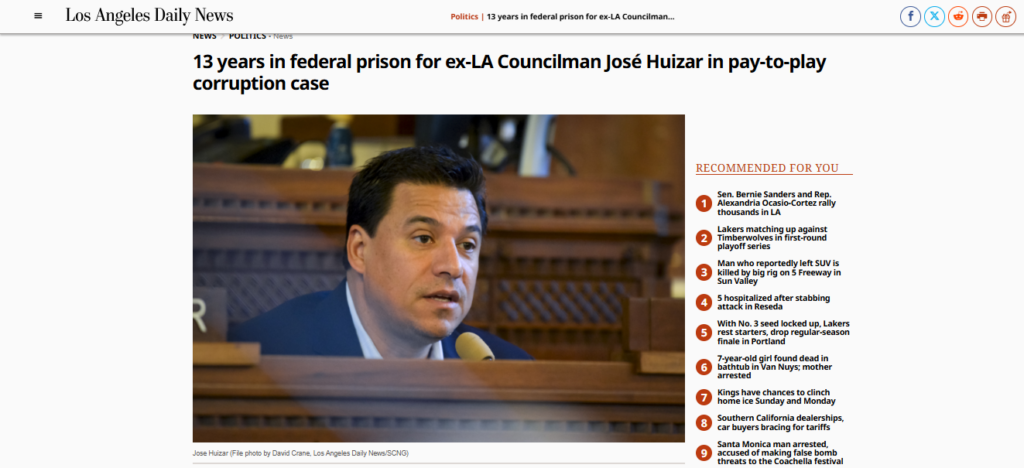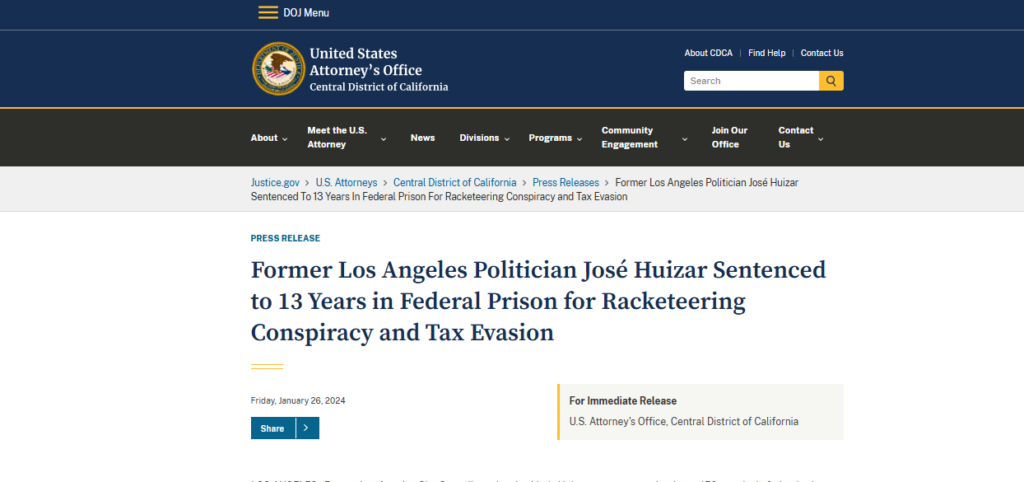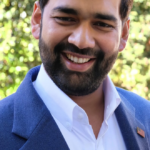A Promising Start Marred by Greed
Jose Huizar, once a celebrated figure in Los Angeles politics, embodied the American Dream for many in his community. Born in a small Mexican village, he rose through education and ambition to become a powerful city councilmember representing Los Angeles’ 14th District. His journey from humble beginnings to City Hall was a beacon of hope for immigrants and working-class families. Yet, beneath this inspiring narrative lay a darker reality—a web of corruption that would unravel his legacy and shake public trust in local governance. Huizar’s story is not just one of personal failure but a cautionary tale about the seductive pull of power and greed. This article delves into the intricate details of his downfall, exploring how a man entrusted with public welfare traded integrity for bribes, betrayed his constituents, and left a stain on Los Angeles’ political landscape.

Early Life: From Zacatecas to Boyle Heights
Jose Huizar’s origins were rooted in hardship. Born in 1968 in a rural village in Zacatecas, Mexico, he grew up in a family with limited means. At a young age, his family immigrated to Los Angeles, settling in Boyle Heights, a vibrant but economically challenged neighborhood. Huizar’s early life was marked by determination to overcome adversity. He excelled academically, earning scholarships to prestigious institutions. His path took him to the University of California, Berkeley, followed by a master’s degree from Princeton University and a law degree from UCLA. These achievements were extraordinary for a first-generation immigrant, making him a role model in his community. Friends and neighbors saw him as proof that hard work could break barriers, but few could predict how his ambitions would later take a destructive turn.
Rise to Power: A Political Star in Los Angeles
Huizar’s entry into politics seemed like a natural progression. After serving on the Los Angeles Unified School District Board from 2001 to 2005, he won a seat on the Los Angeles City Council in 2005, representing District 14, which included Boyle Heights, Eagle Rock, El Sereno, and parts of downtown Los Angeles. As a councilmember, he wielded significant influence, particularly as chair of the Planning and Land Use Management (PLUM) Committee. This role gave him authority over major development projects, positioning him as a gatekeeper for real estate ventures in a rapidly growing city. To his constituents, Huizar was a champion of community projects, advocating for bike lanes, affordable housing, and urban revitalization. His charisma and rags-to-riches story endeared him to voters, but behind closed doors, his priorities began to shift toward personal enrichment.

The Seeds of Corruption: A Pay-to-Play Scheme Takes Root
By the early 2010s, Huizar’s influence had made him a target for developers eager to secure approvals for high-stakes projects. His position on the PLUM Committee allowed him to expedite or delay developments, a power he soon realized could be monetized. Federal investigations later revealed that Huizar orchestrated a sophisticated “pay-to-play” scheme, demanding bribes from developers in exchange for favorable treatment. These bribes took various forms—cash, luxury trips, gambling chips, and even illicit services. Court documents allege he extorted at least $1.5 million, though the true figure may be higher. Huizar’s operation, dubbed the “CD-14 Enterprise,” involved a network of aides, consultants, and lobbyists who facilitated these transactions, turning City Hall into a marketplace for influence.
Key Players: Enablers of a Criminal Enterprise
Huizar didn’t act alone. His special assistant, George Esparza, played a pivotal role, acting as a confidant and intermediary. Esparza later cooperated with the FBI, providing damning evidence, including photos of bribe money and recordings of Huizar’s demands. Another key figure was Wei Huang, a Chinese billionaire developer whose company, Shen Zhen New World I, sought approval for a 77-story skyscraper. Huang allegedly provided Huizar with lavish perks, including private jet flights and $600,000 to settle a sexual harassment lawsuit filed by a former staffer. Huizar’s older brother, Salvador, and his wife, Richelle, were also implicated, accused of laundering bribe money. This inner circle enabled Huizar to operate with impunity for years, exploiting their trust and loyalty to shield his schemes.

Lavish Excesses: A Lifestyle Fueled by Bribes
The bribes Huizar accepted fueled a lifestyle far removed from his Boyle Heights roots. Prosecutors detailed trips to Las Vegas, where he stayed in presidential suites, dined on $10,000 bottles of wine, and gambled with developer-funded chips. He accepted escort services, concert tickets, and stays at luxury resorts, all while maintaining a public image of humility. One particularly brazen incident involved Huizar instructing Esparza to smuggle expensive wine bottles out of a hotel in duffel bags. These excesses weren’t just personal indulgences—they were symptoms of a deeper moral erosion. Huizar’s greed blinded him to the risks, even as FBI scrutiny intensified.
The FBI Investigation: Cracks in the Facade
The unraveling began in 2015 when casino security in Las Vegas flagged Huizar’s gambling activities, tipping off the FBI. By 2018, agents raided his home and offices, seizing $129,000 in cash hidden in his closet. The investigation, codenamed “Operation Casino Loyale,” exposed a sprawling corruption network. Huizar’s attempts to cover his tracks—using aliases like “Juan Rodriguez” on flight manifests and instructing aides to avoid bank reporting requirements—only deepened his legal troubles. The FBI’s evidence, bolstered by Esparza’s cooperation, included thousands of text messages and recordings, painting a vivid picture of a councilmember who viewed developers as “fat cows” to be milked.
Family Betrayal: A Painful Reckoning
Perhaps the most heart-wrenching aspect of Huizar’s case was the involvement of his family. His brother Salvador admitted to laundering cash, lying to investigators to protect José. His wife, Richelle, testified to finding stacks of $100 bills hidden around their home, while his elderly mother, Isidra, was also drawn into the scheme. Their testimony against him during trials was a public spectacle of familial fracture. Salvador’s plea agreement revealed that José instructed him not to ask about the money’s origins, saying it was “better not to know.” For a man who once symbolized family values, this betrayal cut deep, alienating those closest to him and tarnishing their reputations.

Legal Consequences: Guilty Pleas and Prison
In January 2023, Huizar pleaded guilty to racketeering conspiracy and tax evasion, admitting to extorting at least $1.5 million. His plea deal capped his sentence at 13 years, with a minimum of nine, reflecting the severity of his crimes. On January 26, 2024, U.S. District Judge John F. Walter sentenced him to 13 years, ordering nearly $444,000 in restitution to Los Angeles and $39,000 to the IRS. Huizar began his sentence in October 2024 at a low-security prison in Santa Barbara County. The judge’s remarks underscored the broader harm: Huizar’s actions eroded trust in democracy itself, leaving his constituents feeling betrayed by a system meant to serve them.
Impact on Los Angeles: A City’s Trust Shattered
Huizar’s corruption had ripple effects across Los Angeles. His district, already grappling with gentrification and inequality, suffered as development decisions prioritized bribes over community needs. Projects like the proposed skyscraper, tainted by scandal, stalled or faced public backlash. Residents felt deceived by a leader who promised progress but delivered self-interest. The scandal also prompted reforms, with calls for stricter oversight of council powers and campaign finance. Yet, for many, the damage was irreparable—Huizar’s betrayal fueled cynicism, making it harder for honest leaders to regain trust.
The Role of Developers: Complicity in Corruption
The developers who bribed Huizar were not innocent victims. Companies like Shen Zhen New World I and individuals like Wei Huang knowingly participated, exploiting a broken system to advance their projects. Shen Zhen was convicted in 2022 of paying over $1 million in bribes, while others, like developer Dae Yong Lee, faced similar charges. These actors saw Huizar’s greed as an opportunity, undermining fair competition and inflating costs for taxpayers. Their complicity highlights a broader issue: a real estate industry too often willing to bend ethics for profit, with consequences borne by the public.

Huizar’s Apology: Too Little, Too Late
Before his sentencing, Huizar issued a public apology, expressing regret to his family, constituents, and the city. He acknowledged losing his reputation and harming his children’s future, framing his actions as a personal failing. Yet, Judge Walter noted a lack of genuine remorse, pointing to Huizar’s “pervasive misconduct.” For many, the apology rang hollow—a scripted attempt to mitigate punishment rather than a sincere reckoning. Constituents who once admired him saw it as a final insult, a reminder of the trust he squandered.
Lessons Learned: Preventing Future Scandals
Huizar’s case exposed vulnerabilities in Los Angeles’ governance. The PLUM Committee’s unchecked power, lax financial disclosures, and cozy developer relationships created fertile ground for corruption. Post-scandal, the city introduced measures like enhanced ethics training and restrictions on campaign contributions. However, systemic change requires more—transparency in permitting processes, stronger whistleblower protections, and limits on lobbying influence. Huizar’s downfall serves as a warning: without vigilance, ambition can curdle into opportunism, and public service can become self-service.
The Human Cost: Beyond the Headlines
Beyond the legal and political fallout, Huizar’s actions left a human toll. His children faced public humiliation, their futures clouded by their father’s crimes. His community, particularly in Boyle Heights, grappled with disillusionment, feeling abandoned by a leader who once inspired them. Even his accomplices, like Esparza, carried guilt for enabling the scheme. The scandal’s ripple effects touched countless lives, from constituents denied fair representation to city employees tainted by association. Huizar’s greed didn’t just break laws—it broke bonds of trust that may take decades to repair.
Conclusion: A Legacy of Betrayal
José Huizar’s story is a tragedy of wasted potential. A man who rose from poverty to power could have been a lasting force for good, uplifting a city and its people. Instead, he chose corruption, trading integrity for fleeting luxuries. His 13-year sentence and financial penalties are but a fraction of the cost—his true punishment is a legacy defined by betrayal. Los Angeles must now rebuild, not just its skyline, but its faith in leadership. Huizar’s fall reminds us that power, unchecked, can corrupt even the most promising dreams, leaving behind a cautionary tale for future generations.







